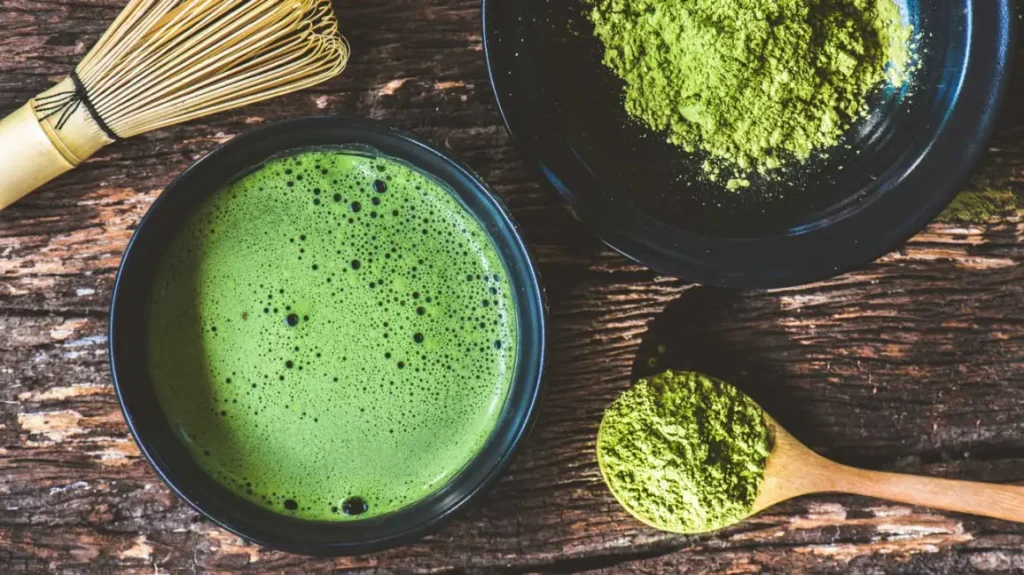
Exploring Matcha: Benefits, caffeine level, Flavors, and comparison with coffee;
With unmistakable flavour and unique health benefits, matcha the vibrant green powder captured hearts of many other people throughout also developed as a rage in recent years. Matcha is so much more, but what is it exactly and how does it compare to popular beverages like coffee? In this blog, we’ll Exploring Matcha, its taste and Amount of Caffeine in Matcha Green Tea, and weigh its benefits and potential downsides.
What is Matcha?
Matcha: The Green Powder Tea from Japan Traditional green tea is simply steeped with leaves in hot water, but matcha is actually the whole tea leaf ground up into powder form. It starts by growing the tea plants in shade, which raises their chlorophyll and amino acid levels for this process. The leaves are then picked by hand and steamed to prevent any oxidation, dried in a special room with heat lamps at specific temperatures, and finally ground into powder form.
Amount of Caffeine in Matcha Green Tea
The simple answer is yes, matcha contains caffeine. that amount can depend on the variety or preparation. A serving of matcha generally contains about the high 60mg range per an 8-ounce portion. This is often lower than a cup of coffee, which can have 95 mg or more of caffeine; however the effects are much longer lasting with matcha due to it containing L-theanine (an amino acid that promotes relaxation and alertness) as well.
What Does Matcha Taste Like?
Matcha has unique and characteristic taste. Strikingly rich in umami (a taste that balances strong flavors with the saliva-inducing acid receptors). there is also an edge of bitterness which tips into earthy or vegetal flavour. The flavor can be different depending on the quality of matcha and how it is prepared. Ceremonial-grade matcha, which is typically used in Japanese tea ceremonies has a milder sweetness to it. while culinary grade you might use while baking and cooking can be earthier rather than sweet.
difference between Matcha and Coffee ?
Here are a few key differences when considering matcha vs. coffee:
- Caffeine: Matcha contains less caffeine than coffee, so it provides a more sustained release of energy. L-theanine in matcha also means that the absorption of caffeine is slowed down so your energy levels remain relatively steady and even.
- Nutrient Profile: Like other green teas, matcha has many types of antioxidant catechins that are linked to various health benefits. Coffee contains antioxidants as well but not the same unique combination matcha has.
- Preparation: Matcha is made by whisking the powder into hot water, forming a green beverage. Coffee is made by taking flavors from roast beans that are ultimately even more bitter and acidic when combine in liquid form.
- Health Benefits: Matcha is frequently praised for its potential ability to boost concentration and reduce stress from L-theanine. Coffee, on the other hand, provides stimulation and focus (although it can make some people jittery or anxious as well).
Matcha Benefits
- Antioxidant-Rich: Matcha contains a high level of antioxidants, particularly EGCG to fight free radicals and reduce oxidative stress.
- Higher Mental Clarity: Caffeine along with L-theanine in matcha makes it a superior focus boosting, concentration improving and cognition enhancing tea.
- Increases metabolism: explored from study, the catechins in matcha can increase metabolic rate and help burn fat.
- Reduces Heart Disease Risk: Matcha antioxidants can lower both cholesterol levels and high blood pressure, which then benefits the total health of your heart.
- Detoxifying: Chlorophyll in matcha helps cleanse the blood and liver.
Disbenefits of Matcha
- Tolerant to caffeine: Although matcha contains less caffeine than coffee, anyone that has sensitivity or intolerance for this substance could face problems such insomnia or jitteriness by excessive intake.
- cost: Quality matcha can be a little on the pricy side, particularly for ceremonial grade.
- Matcha Prep Time: Matcha can be a challenge to make due to the concentration of the tea and how it affects taste, which may not work for someone looking for something quick.
- Possible Contaminants: Given that it is a crop like any other, matcha can be contaminated with pesticides or heavy metals which are present in soils when not acquired from trusted suppliers. Choosing organic or well tested matcha would be one way to minimize this risk.
Conclusion
Exploring Matcha is more than just the latest fad on the market. it carries over a century of traditions, an incredible flavor profile and full list nutritional advantages that make you feel healthier. It will not have the same amount of caffeine, however L-theanine that is present in the matcha helps to neutralize this and therefore makes it an alternative for those looking for a cleaner source of energy. To benefit the most while minding its limitations, and shake it with style whether you are addicted to matcha or just curious about that green powder. So the next time you are at that crossroads, when debating on what beverage to enjoy try some matcha and relish in its distinct taste along with benefits.Exploring Matcha









